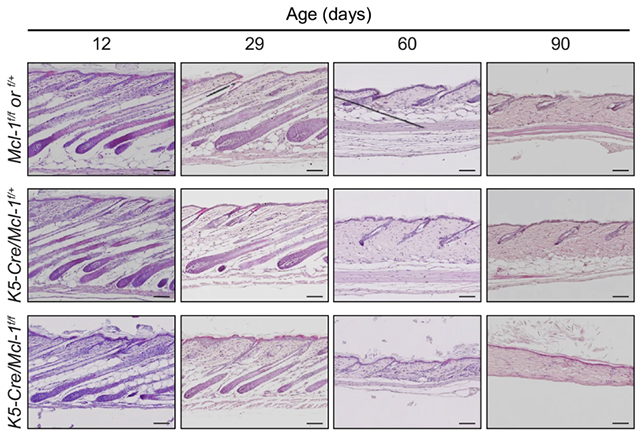A new study has identified a protein that appears to be essential for hair growth and hair follicle protection. Called MCL‑1, it could potentially be targeted by treatments for certain kinds of baldness such as alopecia.
Led by a team from the Duke‑NUS Medical School in Singapore and the Walter and Eliza Hall Institute of Medical Research in Australia, researchers found that when MCL-1 production was blocked in mice, the animals lost their hair later in life.
Hair follicles go through cycles of quiescence and growth, with MCL-1 playing a critical role in the latter phase. The protein doesn't seem to affect the resting phase or the initial development of hair follicles, however.

"Acute MCL‑1 deletion rapidly depletes activated hair follicle stem cells and completely blocks depilation‑induced hair regeneration in adult mice, while quiescent hair follicle stem cells remain unaffected," write the researchers in their published paper.
It was already known that MCL-1 played an important role in protecting a number of different kinds of tissue from apoptosis; the programmed death of redundant or damaged cells to keep the body functioning.
When it comes to hair, MCL-1 prevents follicle stem cells from being stressed and damaged as they 'reawaken' from rest. Without MCL-1 to protect them, these cells stop functioning.
The team was also able to reveal new details on MCL-1's function, identifying ways it suppresses another protein called BAK and how MCL-1 is regulated by a signaling pathway called ERBB. These details could be useful in developing new methods of hair loss treatments.
"These findings suggest that ERBB signaling modulates MCL‑1 expression through translational control mechanisms, particularly during periods of heightened apoptosis and regression in the hair cycle," the researchers write.
The study was based solely on mice, so while there's good reason to think the same processes are happening on the top of our own heads, the findings will need to be replicated in clinical research on humans.
It's also worth bearing in mind that there are several different kinds of alopecia, all with a variety of contributing causes: if treatments are one day developed that focus on boosting MCL-1, they're not going to work for all types of hair loss.
Those limitations aside, this one protein's handiwork is a significant revelation concerning hair follicles' ability to grow hair. The findings could also inform future studies into other processes affected by MCL-1, including cancer cell death.
"This study advances our understanding of the molecular mechanisms underlying hair follicle regeneration and offers new insights into how stem cell survival and tissue regeneration are orchestrated," write the researchers.
"These findings may have broader implications for controlling the survival of stem and progenitor cells in tissue regeneration and cancer expansion."
The research has been published in Nature Communications.
